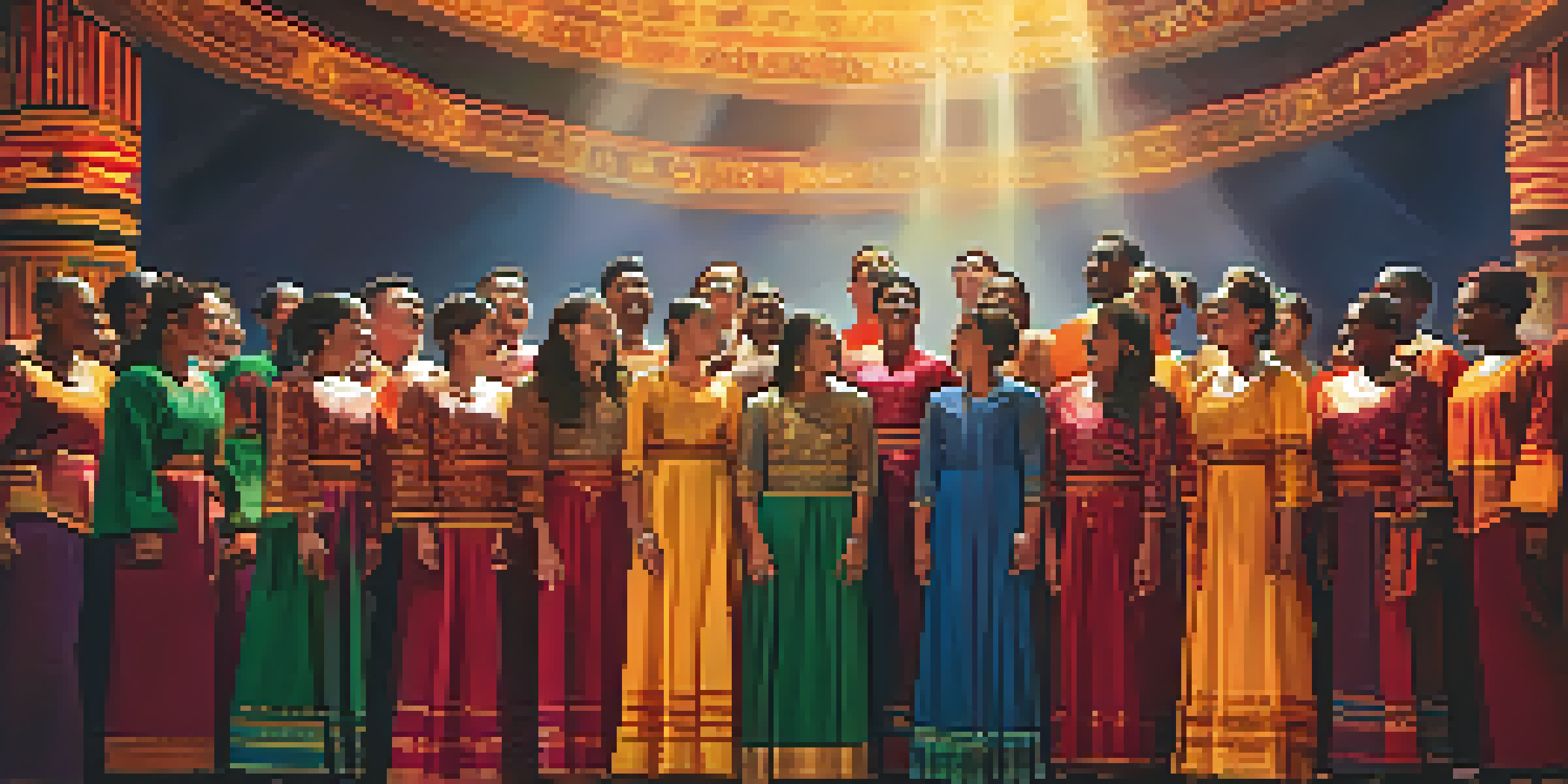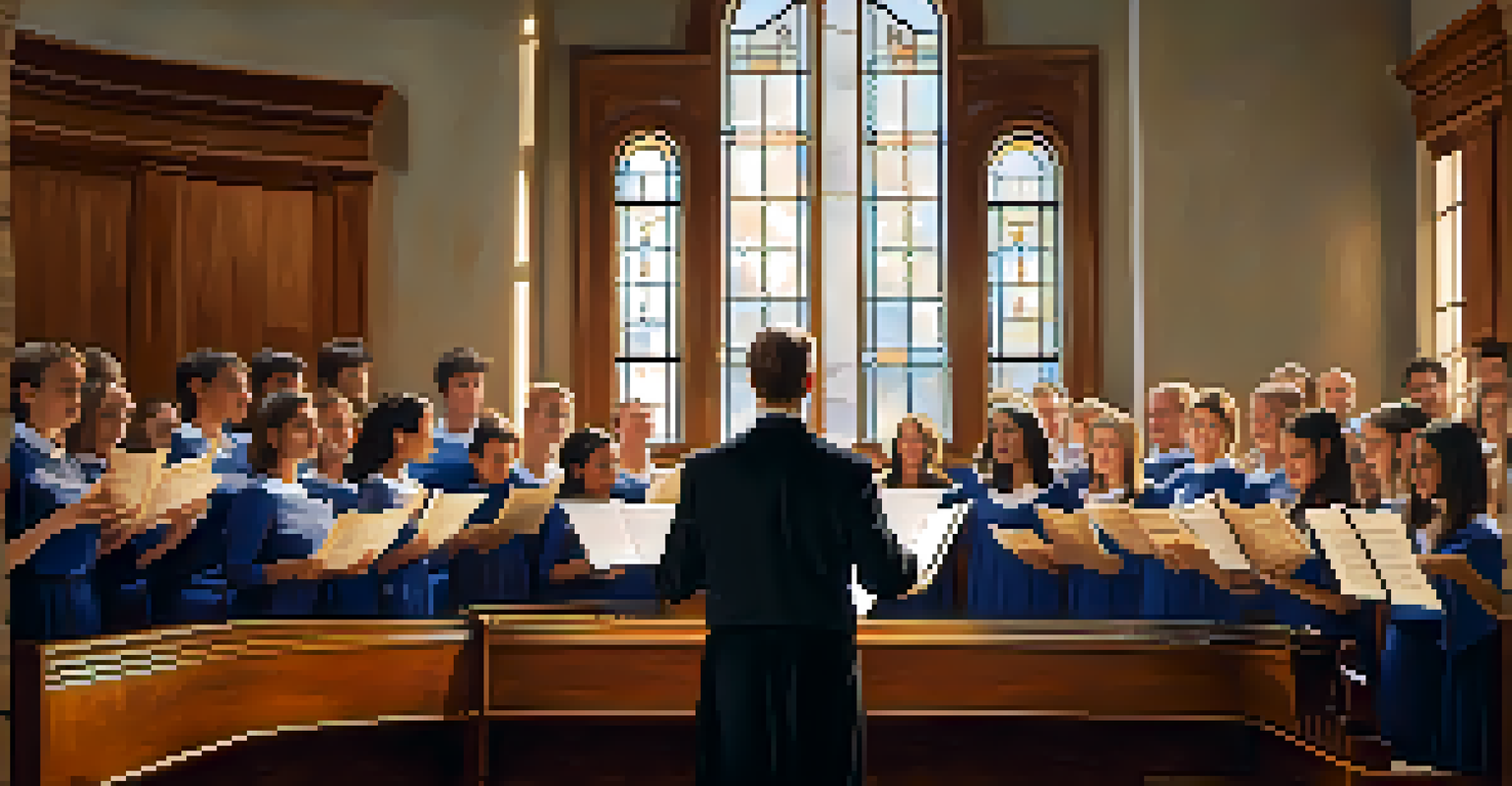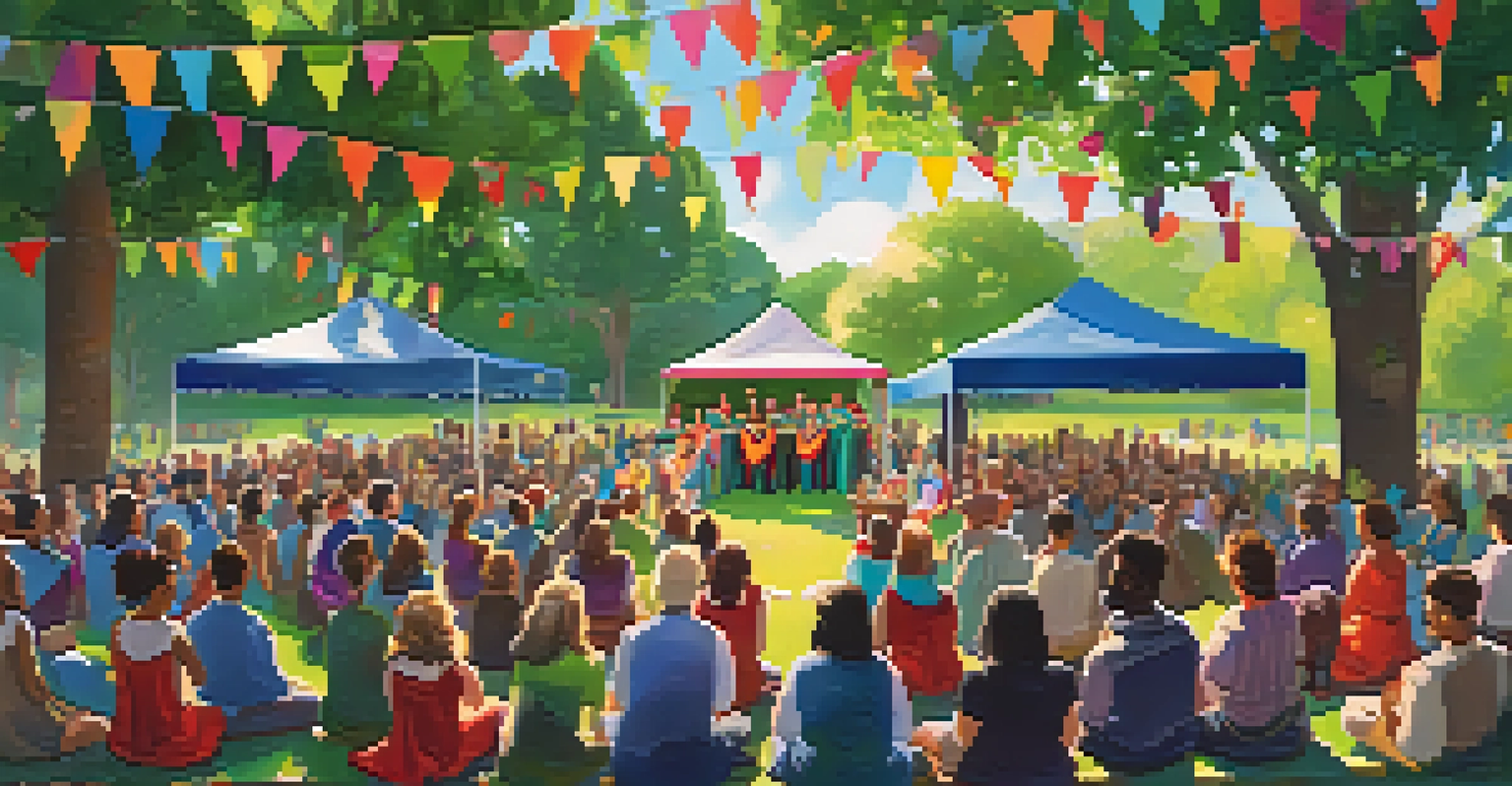The Influence of Choral Music on Cultural Identity

Choral Music as a Reflection of Cultural Heritage
Choral music often serves as a vessel for cultural heritage, reflecting the unique traditions and values of a community. For example, many cultures have specific songs that are sung during festivals or important life events, such as weddings or funerals. These songs not only preserve the language and stories of a culture but also strengthen the bonds among community members who share these experiences.
Music can change the world because it can change people.
When choirs perform traditional pieces, they bring historical narratives to life, allowing audiences to connect with their roots. This sense of continuity can be especially significant for younger generations who may feel disconnected from their heritage. By participating in or listening to choral music, individuals can gain a deeper appreciation of their cultural background.
Moreover, choral music can help to revitalize endangered languages or traditions by incorporating them into contemporary settings. As choirs blend old and new elements, they foster a sense of pride and identity that resonates with both performers and listeners alike.
Community Building Through Choral Participation
Joining a choir can be a powerful way to foster a sense of community and belonging. When individuals come together to sing, they engage in a shared activity that transcends personal differences. This communal effort not only strengthens social ties but also cultivates a supportive environment where members can express themselves freely.

For many, being part of a choir offers a sense of identity beyond just an individual; it connects them to something larger. This shared identity can be particularly empowering, as participants often feel a collective responsibility to uphold the choir's values and traditions. In essence, the choir becomes a microcosm of the larger cultural community.
Choral Music Preserves Heritage
Choral music acts as a vital tool for preserving cultural narratives and practices, ensuring they are passed down through generations.
Additionally, choirs often engage in outreach programs that connect them to the broader community, further enhancing their impact. By performing in public spaces, they share their cultural narratives and invite others to join in the celebration. This not only fosters understanding but also encourages cultural exchange.
Choral Music and Cultural Preservation
One of the most important roles of choral music is its ability to preserve cultural practices and narratives. Through song, communities can pass down stories, values, and beliefs that might otherwise fade away. This is especially evident in indigenous cultures, where oral traditions are often accompanied by choral singing.
Where words fail, music speaks.
Moreover, choirs often take on the role of custodians of their musical heritage. They meticulously learn and perform traditional pieces, ensuring that these songs remain alive for future generations. By doing so, they create a living archive, preserving not just the music but the emotions and experiences tied to it.
In this digital age, choral music also adapts to new platforms, reaching wider audiences and engaging younger people. By embracing technology, choirs can record and share their performances online, allowing cultural stories to be told globally. This blend of tradition and innovation plays a crucial role in keeping cultural identities vibrant.
The Emotional Impact of Choral Music on Identity
Choral music has a unique way of evoking emotions and helping individuals connect with their identities. The act of singing in harmony can create a profound sense of belonging, allowing singers to experience a shared emotional journey. This emotional resonance can deepen one’s understanding of their cultural identity.
For instance, songs that reflect historical struggles or celebrations can evoke feelings of pride or sorrow, reminding singers of their shared history. This emotional connection can be particularly powerful when individuals are singing about their own cultural experiences. It transforms the act of singing into a personal reflection of identity.
Community Bonds Through Singing
Participating in a choir fosters a sense of belonging and connection, creating strong social ties among individuals from diverse backgrounds.
Furthermore, the emotional power of choral music often extends beyond the performers to the audience. Listeners may find themselves moved by the stories being told, prompting introspection about their own cultural identities. This cycle of shared emotion reinforces the importance of choral music in cultural expression.
Choral Music as a Tool for Social Change
Choral music has long been a vehicle for social change, serving as a platform for voices that may be marginalized. Many choirs use their performances to raise awareness about social issues, from civil rights to environmental concerns. This activism through music can inspire communities to come together for a common cause.
By choosing repertoires that address societal issues, choirs can challenge the status quo and promote dialogue. For instance, songs that reflect themes of justice and equality resonate with audiences, encouraging them to reflect on their roles within their own communities. This not only amplifies the choir’s message but also reinforces its cultural identity.
Moreover, collaborations between choirs from different backgrounds can foster understanding and respect among diverse communities. These partnerships often lead to innovative performances that blend various cultural elements, showcasing the beauty of diversity. In this way, choral music becomes a powerful tool for unity and social change.
The Role of Education in Choral Music and Culture
Education plays a vital role in the preservation and promotion of choral music within cultural identity. Music education programs often incorporate choral singing as a means to teach students about their cultural heritage. Through learning traditional songs, students gain insight into their history and the stories of their ancestors.
In schools and community programs, choral music can also serve as an introduction to broader cultural discussions. By exploring the origins of different songs, students can engage with the sociopolitical contexts in which they were created. This educational approach fosters a richer understanding of how choral music shapes and reflects cultural identity.
Choral Music Drives Social Change
Choirs use their performances to raise awareness about social issues, promoting dialogue and unity within communities.
Furthermore, when students participate in choirs, they develop teamwork and communication skills that extend beyond music. These experiences can help shape their identities as culturally aware individuals, instilling a sense of pride in their heritage that they carry into adulthood.
The Future of Choral Music and Cultural Identity
As society continues to evolve, so too does the role of choral music in shaping cultural identity. New genres and styles are emerging, often blending traditional choral elements with contemporary influences. This fusion reflects the dynamic nature of culture, showcasing how identities can grow and adapt over time.
Additionally, the global connectivity provided by technology means that choirs can collaborate across continents, enriching their repertoires with diverse influences. This cross-cultural exchange broadens the understanding of what constitutes cultural identity, inviting new voices into the conversation. It emphasizes the idea that cultural identity is not static but rather a living, breathing entity.

Looking ahead, the continued emphasis on inclusivity and representation in choral music will likely play a significant role in shaping future cultural identities. As more communities find their voices through choral performance, the impact of music on cultural identity will only deepen, allowing for a richer tapestry of narratives and experiences.